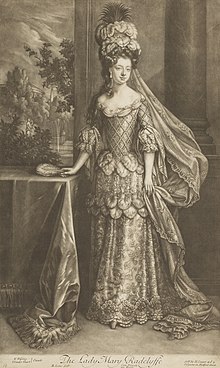Lady Mary Tudor
Mary Tudor | |
|---|---|
| Countess of Derwentwater | |
 Painting by Bernard Lens of Lady Mary Radcliff, Countess of Derwentwater (also known as Mary Tudor) | |
| Born | 16 October 1673 |
| Died | 5 November 1726 (aged 53) Paris, France |
| Spouse(s) | Major James Rooke (m. 1707) |
| Issue | James Radclyffe, 3rd Earl of Derwentwater Lady Mary Tudor Radclyffe Charles Radclyffe, 5th Earl of Derwentwater Hon. Francis Radclyffe Margaret Frances Disney Rooke |
| Father | Charles II of England |
| Mother | Moll Davis |
| Occupation | Actress |
Lady Mary Tudor (16 October 1673 – 5 November 1726), by marriage Countess of Derwentwater,[1] was an actress and biological daughter of King Charles II of England by his mistress, Mary "Moll" Davies, an actress and singer.[2]
Biography
[edit]Early life and title
[edit]
Mary grew up in a house on the south-west side of St James Square, close to St James's Park and Whitehall palace,[3] and from an early age she was surrounded by the high society of The Restoration. Mary followed in her mother's footsteps, and began acting at a young age. She was a part of the many performances put on at Charles II's elaborate court.[4] At age nine, she sang the part of the Roman god of desire, erotic love, attraction and affection, Cupid, alongside her mother, who was starring as Venus, in the play Venus and Adonis.[5]
On 10 December 1680, seven-year-old Mary was, in recognition of her paternity,[1][4] granted by a Royal warrant, the name Tudor (as a nod to their collateral descent from the Tudor family) and the precedence of the daughter of an Earl.[6] In September 1683, she was issued an annuity of £1500 (roughly equivalent to £284,456 in 2023), and five months later, on 21 February, her precedence was heightened to that of a daughter of a Duke.[7]
Marriages and children
[edit]On 18 August 1687, Lady Mary married Edward Radclyffe, 2nd Earl of Derwentwater (9 December 1655 – 29 April 1705) by whom she had four children:[8]
- James Radclyffe, 3rd Earl of Derwentwater (1689–1716)
- Lady Mary Tudor Radclyffe
- Charles Radclyffe (3 September 1693 – 8 December 1746)
- Hon. Francis Radclyffe
Mary formally separated from Lord Derwentwater on 6 February 1700, it could be due to her unwillingness to convert to Roman Catholicism or because she was unfaithful.[9]
On 23 May 1705, shortly after Lord Derwentwater's death, she married secondly, to Henry Graham. Graham died on 7 January 1707. A few months later, on 26 August, Lady Mary married Major James Rooke. By whom she had one daughter[8]
- Margaret Frances Disney Rooke (ca. 1708-1720 1766) married a William Sheldon and had issue.
Death
[edit]Lady Mary died in Paris on 5 November 1726, aged 53.[7]
References
[edit]- ^ a b Norkolk, George Fisher (of Swaffham) (1832). A Companion and Key to the History of England: Consisting of Copious Genealogical Details of the British Sovereigns ... with an Appendix, Exhibiting a Chronological Epitome of the Successive Holders of the Several Titles of the British, Saxon, and English Nobility ... with ... Their Armorial Bearings ... Simpkin and Marshall.
- ^ Walkling, Andrew R. (25 August 2016). Masque and Opera in England, 1656-1688. Taylor & Francis. ISBN 9781317099703.
- ^ "Moll Davis". The Wrong Side of the Blanket. Retrieved 1 July 2020.
- ^ a b Urban, Sylvanus (1794). The Gentleman's Magazine: And Historical Chronicle For The Year MDCCXCIV (1794). Vol. LXIV (64). London (Church Yard, Ludgate-Street): Arkose Press. p. 889.
- ^ "Mary Tudor". The Wrong Side of the Blanket. Retrieved 1 July 2020.
- ^ Paul, James Balfour (1904). The Scots peerage; founded on Wood's edition of Sir Robert Douglas's peerage of Scotland; containing an historical and genealogical account of the nobility of that kingdom. Vol. 1. Allen County Public Library Genealogy Center. Edinburgh : D. Douglas. p. 32.
- ^ a b Cokayne, George E. (George Edward) (1910). The complete peerage of England, Scotland, Ireland, Great Britain and the United Kingdom, extant, extinct, or dormant. Vol. 4. Allen County Public Library Genealogy Center. London : The St. Catherine press, ltd. p. 225.
- ^ a b Profile, thepeerage.com; accessed 25 July 2017.
- ^ Watkins, Sarah-Beth (12 October 2023). Charles II's Illegitimate Children: Royal Bastards. Pen and Sword History. p. 137. ISBN 978-1-3990-0097-0.
